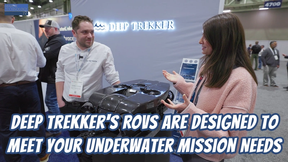Investing in subsea pipeline technology development, PROTUBO has been producing interesting pipe bending solutions.
Pipes are one of the most costly equipments in subsea systems. Here in Brazil subsea pipelines can range from tens, to hundreds of kilometers. Usually subsea pipelines include bended sections and more recently ( T ) pieces are installed in them to facilitate intervention, specially in deep water sections, where intervention costs are huge and new rigless intervention techniques are being introduced.
In deep water pipelines, pipe in pipe technology is being extensively used and upgraded in order to optimize surveillance capabilities, where real time fiber optic surveillance technology appears to be the way to go. New pipe technologies are also being developed to enhance flow assurance capabilities, and that is being very simplistic, because flow assurance involves various disciplines and is all but simple. It is also strategic and fundamental to Players, as it is directly influences production and reflecs on target profit margins.
Serious flow assurance problems can not only decrease but actually interupt production, something that is seriously frowned upon.
Flow assurance, while certainly not restricted to what is going on inside pipelines, does have pipeline quality, integrity, efficiency, strenght and durability as one of its main concerns.
Recently while preparing a study on subsea pipeline manufacturers and manufacturing technologies in Brazil, I came across a few interesting companies and joint ventures, one of which is Protubo.
PROTUBO is an integrated industrial piping company that dedicates special attention to the technological development and the ongoing improvement of its process and cost controls.
It is a joint venture between Ishikawajima Heavy Industries, current IHI Group and Dai-Ichi High Frequency Company of Japan, known worldwide for the application of high frequency induction heating technology and a pioneer in the world of pipe bending and polyethylene resin coating.
Founded in 1975, PROTUBO has been perfecting this technology and performing services for the most diversified fields, such as: ship building, offshore, oil refining, petrochemical, nuclear and others.
The company has a Material Engineering sector to help customers choose the best pipe (raw material) specification to ensure meeting the bend design needs of their projects. The sector also carries out analyses of the metallographic and mechanical properties of both straight pipes and the final bends produced and simulates heat treatment after induction bending (where applicable).
Protubo also has a laboratory to conduct these analyses and to evaluate all aspects of polyethylene coating, such as the adherence, penetration resistance, hardness and cathodic displacement of this coating.
They were also the first company in South America to use heating through alternating current induction for bending pipes.
Bending through high frequency has been applied not only in petrochemical plants, but also in gas pipelines, oil pipelines, mine pipelines, special piping for platforms, high pressure steam pipelines, that is, reaching a wide field of applications.
Controlling the high frequency electrical power, they obtain the ideal bending conditions for each type of material, such as aluminum, carbon, alloy and stainless steels, duplex, Inconel, copper, titanium, API pipes, among others.
It can be applied to long pipes to obtain consecutive bends in the plane or in three-dimensionals. With this, they can manufacture spools without weld points. This assembly system is known as the Elbow-Less System. The Elbow-Less System is an innovative process exclusive to Protubo, that, due to the reduction of the weld points, also eliminates the need for x-rays and tests, providing significant savings in working costs.
During the last few years, PROTUBO has been supplying bends in special materials such as duplex, superduplex, carbon steel internally coated with Inconel, among others, for the offshore sectors, addressing the complex technical requirements demanded in equipment such as Wet Christmas Trees, Risers, Manifolds and PLEM's (pipeline end of manifold).
PROTUBO has its industrial headquarters in Rio de Janeiro and an office in Macaé.
Claudio Paschoa
Photo courtesy Protubo
• 








 December 2025
December 2025



